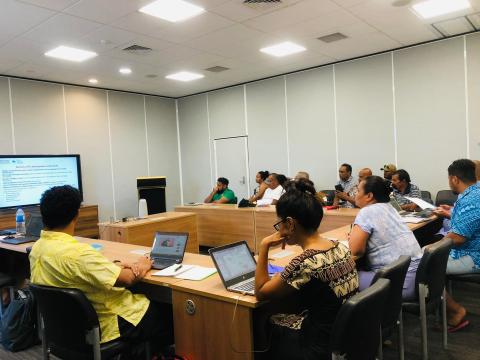PCREEE Supporting E-mobility development and EV Uptake in Tuvalu
Tuvalu, 30 August 2022. The Tuvalu Government positioned the Transport sector in its National Energy Policy (2009-2019) as one of the Key Strategic Areas for Energy Security. Being most vulnerable to rising fuel costs and the impacts of climate change, Tuvalu aims to phase out fossil fuel and increase reliance on renewable energy thus minimising local pollution and GHG emissions in the sector. The Government therefore is leading in supporting e-mobility development by analysing and identifying the most appropriate e-mobility technology, supported by applicable policies and incentives. The Pacific Community’s (SPC) Pacific Centre for Renewable Energy and Energy Efficiency (PCREEE) jointly with the Tuvalu Department of Energy conducted a webinar to support the e-mobility development in Tuvalu.
The purpose of the webinar was to support e-mobility development in Tuvalu through a knowledge-sharing platform where local and regional stakeholders share their knowledge, experiences and challenges, the institutional and regulatory frameworks which support e-mobility and the enabling environments, investments and capacity development that are needed for a national uptake of e-mobility. The webinar is part of the technical assistance that the PCREEE offers to SPC member countries based on its regional Sustainable Mobility Programme PCREEE Regional Program to Promote Electric Vehicle Markets in the Pacific Island Countries and Territories (PICTs) | PCREEE.
The webinar was opened by the Director of the Department of Energy, Mr Simona Kilei. “Since the Transport sector is identified as one of the key strategic area for energy security, Electric Vehicle is the target technology we have identified for phasing out fossil fuel and minimizing emissions in the sector. This webinar is an opportunity to explore more about the EV experiences that are appropriate for Tuvalu,” said Mr Kilei.
Presenters from the region includes Mr. Kakau Foliaki, the Programme Delivery Officer of the PCREEE, Mr. Andrew Campbell, a New Zealand based consultant of the United Nations Industrial Development Organisations (UNIDO) who has mentored PCREEE’s sustainable mobility programme, Mr. Alexander Reddaway of Leaf Capital Pte. Ltd of Fiji and Ms. Kisato Nagakuro from the Overseas Environmental Cooperation Center (OECC) of Japan – who are conducting a feasibility study on energy efficiency in the land transport sector of Vanuatu
Mr Jaime Ovia from the Climate Change Department presented the role of e-mobility in Tuvalu’s NDC and Energy Plan. Tuvalu’s land transport emission accounts for 5% of its Energy Sector (60%) emissions. Mr. Mafalu Lotolua, General Manager of the Tuvalu Electricity Corporation presented the TEC e-Motorcycle Pilot Programme. The e-mobility project aims to evaluate the technical and economic feasibility of deploying e-mobility at a larger scale while creating synergies with the renewable energy power plants in a harmonized energy system. Mr. Lotolua states that the pilot programme is part of Tuvalu Energy Sector Development Project (TESDP).
Mr. Foliaki presented the EV developments in the Pacific Island Countries (PICs) and the support provided by the PCREEE to its member countries on e-mobility. Mr Campbell, highlighted that EVs have taken off in countries where there are specific mandates and EV roadmap adopted by governments, robust financial and economic incentives are in place to activate the market and established standards are in place to ensure safety and resilience of the EV developments. Mr. Reddaway presented on Leaf Capital’s EV charging station business project in Fiji and Ms. Nagakuro highlighted the 19 barriers identified in the Vanuatu study.
The Director of Energy, Mr. Kilei concluded the webinar, thanking PCREEE, presenters and participants for their support and highlighting that the webinar has been successfully conducted.
End





